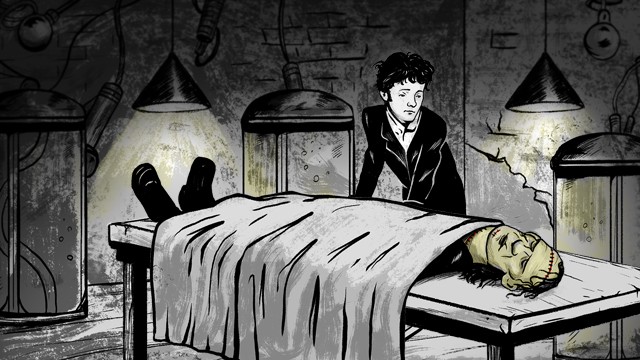The Gothic Element of Overwrought Emotion in Frankenstein
Mary
Shelly's Frankenstein has many gothic elements
throughout. From its setting, to the damsels, and even the supernatural events.
However, one gothic element that was the most prominent for me was the
overwrought emotions.
Throughout
the story, Frankenstein is full of dramatic and emotional monologues.
They colored the book in many ways. For one thing, the characters, specifically
the male ones, seemed homosexual for the way that they presented their emotions
and how much of them they showed. The story begins with Robert Walton writing
to his sister about how he longs for a male friend that he can connect with. He
later meets Victor Frankenstein and talks about how much admiration and awe he
holds towards him. Walton speaks of how he is sad that the one man he was
closed to is reaching the end of his life and how Frankenstein’s emotions
affect him so much. In the end, Frankenstein dies with Walton over him holding
his hand and hanging on to each word he speaks.
In
the opening letters, Frankenstein can barely even tell of his misfortunes because
they pain him so much. Frankenstein often looks to the stars and exclaims to
them full of emotion. Frankenstein also swoons a lot, which is something I’ve
never seen a man do in literature. Frankenstein goes down several times from
being over-emotional and gaining a fever from his hysterics. He never gets over
the death of William, Justine, Henry, and Elizabeth. It is this theme of
revenge and emotion that carries on throughout the story.
Frankenstein’s
monster is also full of emotion. Before he can even speak, he experiences
emotions from rage to sadness. One of the first things the monster does upon
waking in the night is weep. He is also filled with a rage towards himself, his
creator, and mankind. The monster also continuously goes on long rants about
his emotions, usually when he is face to face with Victor Frankenstein and
during his tale. On a side note, I very much enjoyed reading the chapters from
the monster.
In
this story, overall the narration is highly sentimental. It made reading it
fun. I found as I talked to those who have read the book that I was often
saying how sad and emotional it was. The fact that the emotions run high in the
book made my emotions the same as I read it. This technique of an emotion
filled narration is something Mary Shelly did on purpose. Since gothic
literature was written for women by women and in these times women were
emotional and swooned, the emotions that run throughout this story are perfect
for its target audience –women in the early 1800s.
Going into this, I've never read Frankenstein, so I was shocked to see that the monster was actually an intelligent being. All of my life I thought that the monster was an innocent misunderstood creature and this book really shed light on the character and changed my view of it. I'm really happy to have read it!
Going into this, I've never read Frankenstein, so I was shocked to see that the monster was actually an intelligent being. All of my life I thought that the monster was an innocent misunderstood creature and this book really shed light on the character and changed my view of it. I'm really happy to have read it!




Comments
Post a Comment